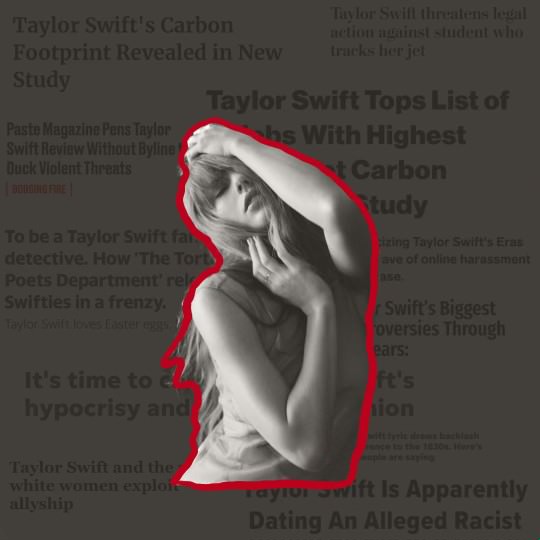
Using the foregrounded defense of being a feminist icon, Taylor Swift has long eluded criticism. The fact of the matter is she has strong-armed an industry into an insane amount of personal profit and fame. She has overstayed her welcome in the limelight and leveraged opportunity after opportunity to become the face of modern American culture. The claim seems arduous to rationalize initially, but Swift’s deep pockets and genre-spanning appeal prove it for her. The second a relevant artist emerges from Swift’s cultural dominance, they are often publicly befriended and assimilated — horizontally integrated. Her work itself is supposedly laden with allusions, forming a gnosis for proper Swifties to access. She becomes the perfect engineer for people’s souls.
Creative ambiguity is the driving force behind Swift’s popularity. According to University of Texas at Austin professor Dr. Elizabeth Scala, Swift’s songs are proximal to actual poetry in such a way that they are left available for anyone to interpret patterns from the lyrics. Each song has the occluded opium of “Easter eggs,” potential references to events in Swift’s life or other songs, that drive frenzied theorists forward. TikToks drawing tenuous conclusions from her public actions (down to liking an Instagram post) constantly go viral. This dash to interpret lyrics and symbology is a quasi-religious impulse, with fans forming a community over uncritical defense of Swift and ravenous enthusiasm for vague nuggets of information.
Many refuse to see she’s no more your friend than Elon Musk is, and that’s the issue — there’s never been a pop star billionaire.
Rabidity is the word, especially after Paste Magazine published a critical review of Swift’s recent album with an anonymous byline to avoid threats. Having failed to pass the strictures of Swift’s online Glavlit, Paste did what it could to avoid the KGB. It did not quite work — alleged author Kayleigh Donaldson received threats absent any proven association with the article.
The referential mania common in Swiftian interpretation leads all roads to a certitude that does not exist elsewhere. Instead of “I read it this way, it could be another way,” fans agree that all the metaphors they see are present, ascribing the multiplicity of truth to Swift’s personal genius. As her popularity has grown, Swiftie’s rancor has grown proportionally. Notably, the notion of diehard “Swifties” was a fixture long before the figure of the “stan” came into vogue. “Swiftie” (trademarked by Swift in 2017) behavior is typically characterized by a parasocial attachment to Swift. Professor Kate S. Kurtin at California State University, Los Angeles called her a “genius” at cultivating parasocial relationships. Many refuse to see she’s no more your friend than Elon Musk is, and that’s the issue — there’s never been a pop star billionaire. It has never been so easy to form a false emotional connection with someone so wealthy. Swifties pick up on the sexless love and commonplace feelings in the lyrics and form obsessive attachments.
Reissuing Swift’s albums in regular intervals alongside the Eras Tour mechanized the reproduction of her sound in a clever way. The “it girl” in pop music typically rotates — Katy Perry, Ariana Grande, etc. Young stars trade their youth for fame and power and pass the baton. A broader generational rotation happens as well (see: Miley Cyrus pivoting with her “Heart of Glass” cover).
Swift has, objectively, overstayed her welcome. Her ongoing Eras Tour claimed her the titular billionaire status. She reissued six consecutive albums and just released a 31-track album. The opener on that (international, multi-leg) tour was none other than Sabrina Carpenter, the Miley Cyrus of the 2020s. With her witty lyrics and cultural sway, Carpenter might have been positioned to become a pop “it girl” of her generation. It is Swift’s world now. Swift’s continued sponging of the limelight has risen to excess. Her wealth is now comparable to the nobles and royals of the world, rather than that of her fans.
Much like many fashion houses using modern “collabs” to improve traction with younger audiences, Swift takes the same earworms that generated her first musings of fame and remakes them with the exact same hooks from the original tracks. Not only is this move tactical, but it is a core facet of Swift’s rapid escalation to global fame. The decision to re-release and record one’s own entire body of work is quite possibly the most derivative act one could do.
Her status as a billionaire should simply emphasize her complete political apathy rather than giving fans another cause to heave a shield in front of.
Far from the purported personal reinvention, Swift’s re-releasing tactic has forced the music industry on its head. Current artists who release new content are overshadowed by songs that have circulated publicly for years and are perpetually elevated by the mainstream. The mainstream is, again, not inherently bad, but cognizance that Swift is a multi-industry mogul operating a profit funnel is needed. Swift is uniquely potent in this regard because of her nature. An artist re-recording her masters to own her own portfolio is something to encourage — if you make it, you should own it! However, it leaves the grounds of celebrating creativity when said recordings become “record-breaking” and art becomes a steady product flow.
Instead of individual creative expression, a politburo of songwriters and creatives alongside Swift (like Jack Antonoff) produce a particular sound that fans latch onto. Being white, cis, blonde, thin, pretty, etc., means Swift was angled perfectly to take on the pop “it girl” mantle, but her social positionality also enables her feelings and ideas to be taken as “default” to the rest of the world. It is the sensible business move — if you were a multi-platinum billionaire who could make money off simple breakup musings by releasing them to a rabid fanbase, wouldn’t you?
In a shocking twist, the billionaire pop star is not some class ally. Swift’s legal team recently threatened litigation against University of Central Florida junior Jack Sweeney for publishing information of her private jet flights online. The team emphasized the lethal threat of Swift’s stalkers in a cease and desist letter. However, Sweeney has committed no crime — flight information about legally registered aircrafts is public by U.S. law. The real threat to Swift and her legal team, and the impetus for her aggression, is the public backlash associated with the information. Swift wants to use her class position to deflect the law and criticism of her frequent private jet flights. She is not relatable, and certainly not within reach.
To address another misgiving, Swift has not acknowledged the ongoing genocide in Palestine. Many artists have failed to do so as well, but it seems unbecoming of the poet who “knows Aristotle” to completely ignore such a grave situation. Common counterarguments give away the game: Swift recognizes her status as insufficiently educated, and no one needs her input! She doesn’t want to get political, and is just focusing on her art! Having only supported voter registration publicly, it is clear that politics is more a question of aesthetics or inconvenience for Swift, as is true for many people. Her status as a billionaire should simply emphasize her complete political apathy rather than giving fans another cause to heave a shield in front of.
Swift is just a musician. However, the true sway of billionaires can never be ignored. Hopefully, people’s interpretive faculties do not continue to suffer in the social media age and we can collectively arrive at a better visage of fandom. Regardless, Swift will amass wealth, acolytes and influence at an unprecedented rate in the music industry. She is, in many ways, a nightmare dressed like a daydream.



